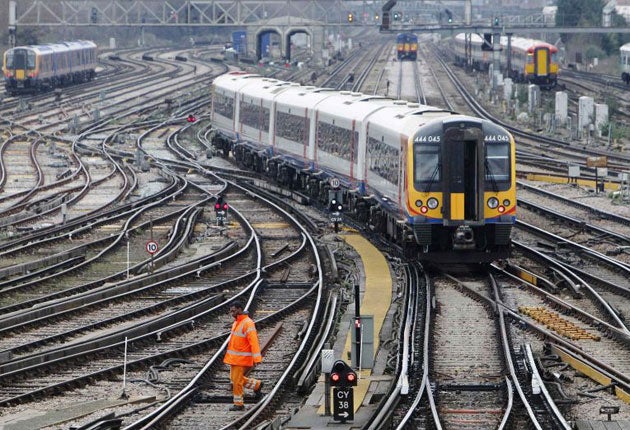Train punctuality falls to lowest level in two years, as Network Rail admits its trains-on-time target won't be met until the end of the DECADE

Rail punctuality fell to its lowest level in two years last month, new figures show, as the company in charge of running the network admitted it would not meet its trains-on-time target until the end of the decade.
Almost 20 per cent of trains in December were at least five minutes late with only two of 15 the private rail franchises meeting the Government’s 92.5 per cent punctuality target.
Overall the statistics reveal that rail punctuality has only improve fractionally since the figures were first collected eight years ago.
In December 2005 79.53 per cent of trains ran within five minutes of their scheduled departure time compared to 83.9 per cent in December 2012.
The latest figures released this month show that the rail companies with the worse punctuality rates continue to be long distance inter-city routes such as Virgin, East Coast and Cross Country. Over 20 per cent of their trains were more than ten minutes late.
But unveiling plans to spend £37.5bn to run and expand Britain’s railways, Network Rail said it expected no overall improvement in train punctuality compared with the trains-on-time target for 2009-2014. A figure of 92.5 per cent punctuality was set for that period – a target Network Rail has so far failed to meet.
In today’s business plan, the company said it expected to achieve a trains-on-time figure of 92.5 per cent “by the end” of the period 2014-2019.
“We want to do better than that, but we are facing up to some problems that come with success - that is, more trains and more passengers on an increasingly congested network,” the company said.
“Even the smallest delay at busy times can cause a ripple effect which disrupts passengers several hours later, hundreds of miles away.”
This is despite plans for inflation busting fare rises for the rest of this decade.
Among Network Rail’s plans, which will have to be approved by the Office of Rail Regulation, are proposals to:
:: Providing an extra 170,000 commuter seats at peak times by 2019 and 355,000 more trains in service with the railways carrying as many as 225m more passengers.
:: 700 more trains a day linking key northern cities and a 10-minute reduction in journey time between Manchester and Leeds.
:: Further electrification work to cut CO2 emissions per passenger cut by 37 per cent and reduce risk at level crossings by 8 per cent.
:: Shutting hundreds of signal boxes and merging them into 14 major operations centres.
Network Rail also predicted that the cost to the tax payer of running the railway would be cut by a further 18 per cent and annual public subsidy reduced to between £2.6bn and £2.9bn in 2019 – down from £4.5bn in 2009 and £7bn in 2004.
However Network Rail chief executive, Sir David Higgins, admitted that the industry, under pressure to cut costs, had entered “the era of trade-offs”.
“As our railway gets busier the challenges get bigger and more complex. We have entered an era of trade-offs. Increasingly we have to balance the need to build more infrastructure, run trains on time and cut costs, and in many areas choices will need to be made,” he said.
The ORR’s chief executive Richard Price said: “Ministers have shown huge faith in what the railways can add to Britain’s society and economy, committing to around £20 billion-worth of public money at a time when there is little money to go around.
“Key to maintaining rail’s success will be openly justifying this significant commitment of public money.
“Taxpayers significantly fund the railways, and have every right to see where this money is being spent.”
Michael Roberts, chief executive of the Association of Train Operating Companies, said they were already performing well.
“We aim to build on today’s near record levels of customer satisfaction by combining the best of the public and private sectors to provide newer trains, quicker journeys and more seats,” he said.
But Manuel Cortes, leader of the TSSA rail union, said: “We obviously back rail investment to improve the service but passengers have already suffered enough pain with a decade of annual inflation-plus fare increases.
“They should not now be expected to face another six years of even higher fares.”
Subscribe to Independent Premium to bookmark this article
Want to bookmark your favourite articles and stories to read or reference later? Start your Independent Premium subscription today.

Join our commenting forum
Join thought-provoking conversations, follow other Independent readers and see their replies